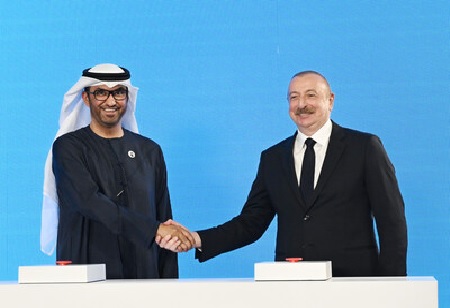
Azerbaijan President Initiates Masdar 1GW Solar and Wind Projects

 Masdar, the UAE's leading clean energy entity, and SOCAR, the State Oil Company of Azerbaijan, have initiated three significant solar and wind projects in Azerbaijan, collectively boasting a capacity of 1 gigawatt (GW). The groundbreaking ceremony coincided with the commencement of Baku Energy Week, underscoring Masdar's enduring commitment to Azerbaijan as a key global partner in the energy sector.
Masdar, the UAE's leading clean energy entity, and SOCAR, the State Oil Company of Azerbaijan, have initiated three significant solar and wind projects in Azerbaijan, collectively boasting a capacity of 1 gigawatt (GW). The groundbreaking ceremony coincided with the commencement of Baku Energy Week, underscoring Masdar's enduring commitment to Azerbaijan as a key global partner in the energy sector.
HE Ilham Aliyev, President of Azerbaijan, and HE Dr Sultan Al Jaber, UAE Minister of Industry and Advanced Technology, Chairman of Masdar, and COP28 President, presided over the ceremony. Also present were HE Parviz Shahbazov, Azerbaijan Minister of Energy, HE Mikayil Jabbarov, Azerbaijan Minister of Economy and Chairman of the Supervisory Board of SOCAR, and Masdar CEO, Mohamed Jameel Al Ramahi.
The projects include the 445MW Bilasuvar Solar PV Project, the 315MW Neftchala Solar PV Project, and the 240MW Absheron-Garadagh Onshore Wind Project. Investment agreements were finalized in October 2023, followed by the signing of essential agreements such as Power Purchase Agreements, Transmission Connection Agreements, and Land Lease Agreements.
HE Dr Sultan Al Jaber emphasized the significance of this collaboration, highlighting its role in expanding Azerbaijan's renewable energy capacity and facilitating its journey towards energy diversification, job creation, and sustainable economic growth. He underscored the UAE's commitment to tripling renewable energy capacity by 2030 as part of the historic UAE Consensus.
HE Parviz Shahbazov expressed gratitude for the partnership, describing it as a historic milestone in Azerbaijan's green energy endeavours and a testament to the strong bonds between Azerbaijan and the UAE. He emphasized the positive impact of these projects on sustainable development, including significant electricity generation, gas savings, and carbon emissions reduction, aligning with their joint commitment to a greener future as COP host countries.

